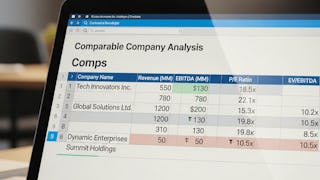- Browse
- Valuation
Valuation Courses
Valuation courses can help you learn financial modeling, discounted cash flow analysis, market valuation techniques, and investment appraisal methods. You can build skills in analyzing financial statements, assessing risk, and understanding market dynamics. Many courses introduce tools like Excel for financial modeling, Bloomberg for market data, and various valuation software that facilitate real-time analysis and decision-making.
Popular Valuation Courses and Certifications
 Status: NewNewStatus: PreviewPreview
Status: NewNewStatus: PreviewPreviewSkills you'll gain: Capital Expenditure, Financial Modeling, Financial Analysis, Revenue Forecasting, Business Valuation, Financial Statement Analysis, Financial Statements, Financial Forecasting, Depreciation, Cash Flow Forecasting, Balance Sheet, Annual Reports, Sales, Working Capital, Microsoft Excel
Mixed · Course · 1 - 4 Weeks
 Status: NewNewStatus: PreviewPreview
Status: NewNewStatus: PreviewPreviewSkills you'll gain: Securities (Finance), Financial Analysis, Financial Market, Investments, Credit Risk, Portfolio Risk, Portfolio Management, Analysis, Cash Flows, Risk Analysis, Market Dynamics
Mixed · Course · 1 - 4 Weeks
 Status: NewNewStatus: PreviewPreview
Status: NewNewStatus: PreviewPreviewSkills you'll gain: Business Valuation, Financial Analysis, Financial Modeling, Financial Statement Analysis, Investment Banking, Mergers & Acquisitions, Corporate Finance, Interviewing Skills, Real Estate, Benchmarking, Microsoft Excel
Mixed · Course · 1 - 4 Weeks
 Status: Free TrialFree TrialU
Status: Free TrialFree TrialUUniversity of Michigan
Skills you'll gain: Mergers & Acquisitions, Strategic Decision-Making, Financial Analysis, Return On Investment, Business Valuation, Cost Benefit Analysis, Financial Modeling, Finance, Pharmaceuticals, Investment Banking, Negotiation, Healthcare Industry Knowledge, Corporate Finance, Health Care, Cash Flows
4.5·Rating, 4.5 out of 5 stars17 reviewsIntermediate · Course · 1 - 4 Weeks
 Status: Free TrialFree TrialU
Status: Free TrialFree TrialUUniversity of Illinois Urbana-Champaign
Skills you'll gain: Mergers & Acquisitions, Working Capital, Cash Management, Financial Analysis, Business Valuation, Financial Statement Analysis, Finance, Financial Management, Corporate Finance, Return On Investment, Capital Budgeting, Cash Flow Forecasting, Financial Accounting, Performance Measurement, Risk Analysis
Build toward a degree
4.7·Rating, 4.7 out of 5 stars1.2K reviewsBeginner · Course · 1 - 3 Months
 Status: Free TrialFree TrialU
Status: Free TrialFree TrialUUniversity of Minnesota
Skills you'll gain: Competitive Analysis, Medical Devices, Payment Systems, Intellectual Property, Health Systems, Healthcare Industry Knowledge, Commercialization, Leadership Development, Health Care Administration, Managed Care, Product Management, Go To Market Strategy, Regulatory Affairs, New Product Development, Hospital Experience, Stakeholder Analysis, Pharmaceuticals, Organizational Structure, Market Opportunities, Medical Equipment
4.5·Rating, 4.5 out of 5 stars1.5K reviewsBeginner · Specialization · 3 - 6 Months
 Status: NewNewStatus: PreviewPreview
Status: NewNewStatus: PreviewPreviewSkills you'll gain: Financial Modeling, Financial Statement Analysis, Financial Analysis, Depreciation, Financial Forecasting, Business Valuation, Operating Expense, Balance Sheet, Income Statement, Accounts Payable, Equities, Capital Expenditure, Cash Flows, Working Capital
Mixed · Course · 1 - 4 Weeks
 Status: NewNewStatus: PreviewPreview
Status: NewNewStatus: PreviewPreviewSkills you'll gain: Financial Statement Analysis, Financial Accounting, Financial Analysis, Balance Sheet, Financial Modeling, Income Statement, Business Valuation, Financial Forecasting, Investment Banking, Cash Flows, Regulatory Compliance, Banking, Finance, Retail Banking, Ethical Standards And Conduct
Mixed · Course · 1 - 4 Weeks
 Status: NewNewStatus: PreviewPreview
Status: NewNewStatus: PreviewPreviewSkills you'll gain: Equities, Capital Markets, Investment Banking, Business Valuation, Financial Modeling, Global Marketing, Market Share, Financial Forecasting, Financial Analysis, Market Dynamics, Financial Statements, International Finance, Financial Regulations, Underwriting, Fundraising
Mixed · Course · 1 - 3 Months
 Status: PreviewPreview
Status: PreviewPreviewSkills you'll gain: Social Impact, Return On Investment, Sustainability Reporting, Needs Assessment, Program Evaluation, Project Scoping, Project Performance, Strategic Communication, Stakeholder Engagement, Data Collection
4.6·Rating, 4.6 out of 5 stars17 reviewsIntermediate · Course · 1 - 4 Weeks
 Status: PreviewPreviewU
Status: PreviewPreviewUUniversity of London
Skills you'll gain: Brand Management, Branding, Brand Marketing, Brand Strategy, Brand Awareness, Employee Engagement, Marketing Management, Global Marketing, Internal Communications, Customer experience strategy (CX), Human Resources, Organizational Change, Consumer Behaviour, Cross-Functional Collaboration
4.9·Rating, 4.9 out of 5 stars7.8K reviewsBeginner · Course · 1 - 3 Months
 Status: Free TrialFree TrialR
Status: Free TrialFree TrialRRice University
Skills you'll gain: Financial Market, Investments, Securities (Finance), Financial Systems, Investment Management, Securities Trading, Capital Markets, Equities, Finance, Financial Services, Market Liquidity, Asset Management, Portfolio Management, Derivatives, Fixed Asset, Cash Flows
4.5·Rating, 4.5 out of 5 stars2.2K reviewsMixed · Course · 1 - 4 Weeks
In summary, here are 10 of our most popular valuation courses
- Financial Modeling of Tesla: Analyze & Value: EDUCBA
- Fixed Income Securities: Analyze, Value & Apply: EDUCBA
- Comparable Company Analysis: Apply, Evaluate & Excel: EDUCBA
- Introduction to Healthcare Finance: University of Michigan
- Corporate Finance I: Measuring and Promoting Value Creation: University of Illinois Urbana-Champaign
- Healthcare Marketplace: University of Minnesota
- Financial Modeling of IBM: Analyze & Value: EDUCBA
- Master Financial Modeling in Islamic Banking: EDUCBA
- Equity Capital Markets: Analyze & Forecast IPOs: EDUCBA
- How to Conduct a Social Impact Assessment with SROI: Coursera










